March 26, 2010
Air Date: March 26, 2010
FULL SHOW
SEGMENTS
No Waves of Hope
View the page for this story
The Convention on International Trade in Endangered Species (CITES) meeting in Doha, Qatar has wrapped up. The outcome was anything but positive for marine conservation--with all measures on sharks, coral and the Atlantic bluefin tuna defeated. Host Jeff Young talks with Susan Lieberman of the Pew Environment Group about what happened at the CITES meeting and about future steps for protecting marine species. (06:25)
Sun Sets on Udall
View the page for this story
As Secretary of the Interior under Presidents John F. Kennedy and Lyndon Johnson, Stewart Udall fought to protect the nation's water, air, and land. His unrelenting belief that wilderness needed protection was instrumental in the creation of national parks and the passage of the 1964 Wilderness Act Living on Earth offers this tribute to Stewart Udall. (05:30)
Listener Letters
View the page for this story
Living on Earth dips into the mail bag to hear what listeners have to say. (02:20)
Pushback in California
/ Ingrid LobetView the page for this story
California officials are putting into effect the most comprehensive climate change measures in the country. But unemployment in the state is over 12 percent and a pushback against the state's major climate law is brewing. As Living on Earth’s Ingrid Lobet reports, supporters are gathering signatures for a fall ballot initiative that would roll back the law. (06:15)
Climate Change, Plan B
View the page for this story
In the absence of political action to cut greenhouse gas emissions, some scientists are starting to seriously consider schemes to mitigate runaway global warming. But big plans to cool the earth, or geoengineering, pose big questions about how and whether we can responsibly manipulate the earth's natural systems. Host Jeff Young discusses the people and concerns driving the geoengineering debate from Jeff Goodell, author of the new book, How to Cool the Planet. (09:45)
The Postman Rings Greener
View the page for this story
April 3rd marks the 150th anniversary of the famed Pony Express. Just as that first overland mail delivery was replaced by the telegraph, today's postal service is struggling to stay in business as e-communications become the norm. The USPS is exploring the possibility of eliminating Saturday delivery to save money. Sam Pulcrano, vice president of sustainability for the postal service, explains to host Jeff Young how one day less would affect the USPS’s carbon footprint. (05:00)
Food Revolution
View the page for this story
Some revolutions start on a picket line - Jamie Oliver's Food Revolution starts on the lunch line. The celebrity chef's new TV show confronts America’s obesity epidemic in the least healthy part of the country. Host Jeff Young talks with Oliver about eating well as a matter of life and death. (05:00)
Not Your Average Cabbage
/ Ike SriskandarajahView the page for this story
Boston celebrates the national dish of Korea with its first annual Kimchi pickle-off. The pungent spicy cabbage brought out plenty of Korean-Americans, farmers and foodies to indulge in fermentation fervor. Living on Earth’s Ike Sriskandarajah reports. ()
Show Credits and Funders
Show Transcript
HOST: Jeff Young
GUESTS: Susan Lieberman, Jeff Goodell, Sam Pulcrano, Jamie Oliver
REPORTERS: Ingrid Lobet, Ike Sriskandarajah
[THEME]
YOUNG: From Public Radio International - this is Living on Earth.
[THEME]
YOUNG: I’m Jeff Young. An international meeting on trade in endangered species falls short on protection of marine wildlife.
LIEBERMAN: It was actually a very sad two weeks for conservation. What didn't happen is increased protection for Atlantic bluefin tuna and six species of sharks who desperately need that protection.
YOUNG: A report from the CITES conference. Also, pushback in California against that state’s pioneering efforts to address climate change. Opponents, bankrolled by oil companies, try to roll back the law.
SCHWARZENEGGER: I think that the California people are outraged by the fact that Texas oil companies are coming to California to try to change laws and policies in California. I mean it's outrageous.
YOUNG: And a tribute to conservationist Stewart Udall. These stories and more this week on Living on Earth. Stay with us!
[THEME]
ANNOUNCER: Support for Living on Earth comes from the National Science Foundation, and Stonyfield Farm.
[THEME]
No Waves of Hope
YOUNG: From the Jennifer and Ted Stanley Studios in Somerville, Massachusetts — this is Living on Earth. I’m Jeff Young. A missed opportunity to protect some of the sea’s most threatened animals. The 15th meeting of the Convention on International Trade in Endangered Species, or CITES, just wrapped up in Doha, Qatar. The UN-organized body sets rules for the global sales of products made from rare animals. The agenda included several marine species—Atlantic bluefin tuna, some sharks and corals—that scientists warn are in deep trouble.
Susan Lieberman monitored the CITES meeting for the Pew Environment Group, where she directs international policy. And she joins us now from Doha. Ms. Lieberman, welcome to Living on Earth.
LIEBERMAN: Thank you.
YOUNG: So, what happened or, I guess, did not happen with these marine animals?
LIEBERMAN: It was actually a very sad day or a sad two weeks for conservation here at Doha, at the Convention on International Trade and Endangered Species. What didn’t happen is increased protection for Atlantic bluefin tuna and six species of sharks who desperately need that protection.
YOUNG: What does the science tell us about the status of the bluefin and these sharks?
LIEBERMAN: Well, that’s what really interesting and in particularly disappointing because the science was strong, and in fact, there was no debate on the science. The Atlantic bluefin tuna has declined more than 85 percent, that means there’s less than 15 percent left due to excessive fishing mainly due to the demand for sushi and sashimi, as well as due to over-fishing and rampant illegal fishing, as well. The science was clear. Monaco had submitted a proposal, the United States, the European Union, Norway—many other countries going into the meeting had supported it due to very intensive negative lobbying led by Japan.
It was defeated. In addition there were the proposals for the sharks, all of which were not for a trade ban, but they were proposals to regulate and manage the trade just to make sure it’s sustainable, just to have some level of control. The science was also sound there. The hammerhead shark, for example, is an endangered species and it’s been reduced in some areas more than 90 percent. Yet at the end of the day the majority supported it, but not the two-thirds required to get the protection needed for that shark.
YOUNG: So what does this mean, now, for the Atlantic bluefin and these species of sharks?
LIEBERMAN: Well, for the sharks it means that after the CITES meeting there is the same level of international protection there was before the meeting—and that’s zero. What it means is on the high seas there’s no control about the numbers taken of hammerhead sharks for example, or oceanic white tips. We know up to 73 million sharks of many species are killed every year for the fin trade. And right now there’s absolutely no international regulation or control of that trade.
YOUNG: And for the bluefin, where as I understand it the situation is quite dire, is there any other regulatory body that might act here?
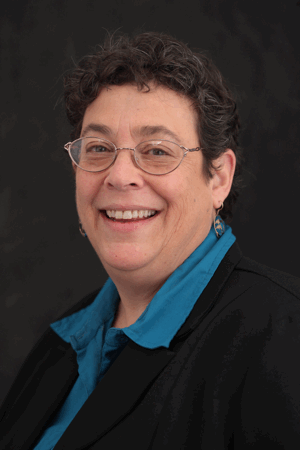
Dr. Sue Lieberman (Courtesy of Pew Environment Group)
LIEBERMAN: Yes, the Atlantic bluefin tuna is managed by the International Commission for the Conservation of Atlantic Tuna, that’s more than 40 countries; it’s a treaty that gets together every year to manage this fish. They have been a dismal failure at managing this fish, and that’s not a quote from me that’s their own internal review. And the members of CITES—the Convention on International Trade and Endangered Species—basically decided to give the fish back to that commission, that International Commission for Atlantic Tunas, and say, it’s your fish and you have the responsibility to manage it.
YOUNG: So, the more valuable the species, the harder it is to get a body like this to act, but also the greater the demand for the animal. Is there anyway out for the bluefin tuna or is it going to be fished right into extinction?
LIEBERMAN: Well, I certainly hope—and we certainly hope—that the bluefin tuna will not be fished into extinction. The bluefin tuna crashed in Brazil in the 1950s and that’s why this International Commission for Conservation of Atlantic Tuna—ICCAT—was invented. They made promises here to finally listen to science for the first time instead of always assigning quotas higher than the scientists recommended. And the United States delegate here said, if ICCAT doesn’t do what it promised, then we will be back at the next CITES meeting.
So at least the Atlantic bluefin tuna has ICCAT to hope for, the sharks have nothing to hope for though the sharks are extremely valuable economically. They’re also valuable ecologically in the ocean and that’s why we’re going to work with governments who do support conservation to turn the tide here and hopefully at the next CITES meeting provide the protection necessary.
YOUNG: So what is this tell us about the usefulness of the CITES process. I mean, I understand in the past they’ve taken important action to limit trade in ivory, and rhino horn, and things like that, but what about this?
LIEBERMAN: Well, it is very disappointing and I don’t want to give the impression that there are no marine species listed in CITES. All the hard coral are listed, the Queen conch—people may be familiar with that species—all the seahorses, the sturgeon (they provide caviar) are regulated by CITES. But for highly commercial marine species such as the shark, such as the tuna, such as the red and pink coral, this is a setback for their conservation. But I believe firmly that CITES is the only international mechanism out there that can regulate trade in these species.
And trade is the number one threat to these species. If you look at the sharks: it’s not climate change, it’s trade. It’s trade demand; it’s demand for their fins on the uncontrolled international markets. So I don’t want to say CITES is a failure. This conference did not succeed in providing the protections necessary to those species. But I firmly believe that there’s a chance in the future.
YOUNG: Susan Lieberman with the Pew Environment Group, thank you very much.
LIEBERMAN: My pleasure, thank you!
Related links:
- CITES website
- Click here to learn more about the Pew Environment Group’s marine conservation campaigns.
[MUSIC: Pantha Du Prince “Satellite Snyper” from Black Noise (Rough Trade Records 2010)]
Sun Sets on Udall
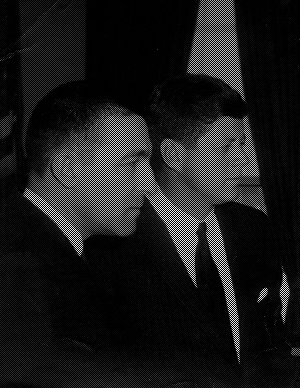
Stewart Udall with President Kennedy.
YOUNG: Stewart Udall, former congressman, interior secretary and towering figure of conservation died this month. He was 90-years-old. As secretary of the interior for presidents Kennedy and Johnson, Stewart Udall was instrumental in passing fundamental environmental laws in the 1960s. He reflected on that period in a 2006 interview with Living on Earth.
STEWART UDALL: Protecting endangered species, cleaning up the nation's rivers, clean air, clean water. And it was a wonderful time, kind of a golden age of the environmental movement.
YOUNG: He worked with his brother, Arizona congressman Morris Udall, to create national parks like Redwood in California and Canyonlands in Utah—names now synonymous with America’s natural heritage. And Stewart Udall was the driving force behind the creation of the 1964 Wilderness Act.

Stewart Udall with President Kennedy.
UDALL: It was just the right time for a new big idea like this, you know. No other country in the world had a wilderness policy. And it just struck a chord. It was very popular in the 1960s. Now, we had to fight, and it took four years to get it done, but it turned out there was overwhelming support in this country. And all of us—I was startled, even, at the margin by which it passed the Senate, which I think was 78 to 12. That shows you it was bipartisan, and it was across the country. We had tremendous support for it. And this was really an expression of the desires of citizens.
YOUNG: The country’s wilderness system now protects some 107 million acres.
Later, Stewart Udall fought to win compensation for Native Americans poisoned by uranium mining and nuclear weapons tests.
He also wrote about western history, energy problems and landscape conservation.
And Mr. Udall tapped into great voices from American literature to expand America’s environmental consciousness. He invited writers and poets like Wallace Stegner and Robert Frost to Washington.
TRAUTWEIN: Here’s a guy who could talk to Robert Frost in the morning and Lyndon Johnson in the afternoon and have both of their ears.
YOUNG: That’s Mark Trautwein. He got to know the Udalls during his 13 years of work as legislative assistant to Congressman Morris Udall.
TRAUTWEIN: Over an arc of 30 years, Stewart and Mo Udall were the indispensable men of the conservation movement in America because Stewart got it. He got that we could not go on consuming ourselves and that our natural heritage was something to be nurtured.
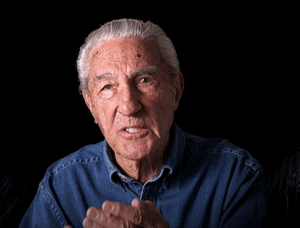
YOUNG: What was it about the Udalls that made them do that, that drove them?
TRAUTWEIN: They were men who believed in public service, they believed in the greater good, and they were quintessentially men of the west. But a kind of a modern western consciousness that looked at landscape that had been handed down and saw that great deal of what was valuable about and so important about it was being lost. And they learned lessons from what they saw around them and they sought to apply them to their politics and to their life’s work.
YOUNG: The Udall brothers also built something else—a family political dynasty. Each brother had sons who are now U.S. senators. Mo’s son Mark is a Colorado Senator. Stewart’s son Tom is a senator from New Mexico.
TOM UDALL: My father instilled in me the idea that if you take care of the land the land will take care of you. It's very important what my father and Mo did. It's a very significant legacy. And I appreciate it and I think the American people appreciate it, and I think they'd like us to expand on that.
YOUNG: But in our 2006 interview, Stewart Udall wasn’t so sure that his son and nephew—or any political leaders—could do ambitious conservation today. The political environment, he thought, made environmental gains on the scale of the Wilderness Act unlikely.
S. UDALL: I believe if you proposed the wilderness bill today, it would not go through Congress. The divisions are so sharp and the ideologies are so different that I doubt it would get to first base. It has become an ideology that more conservation is not good for the country and it makes me sad. I'm a saddened person compared to what I was in the 1960s. But maybe it'll turn, there are cycles in history, maybe it'll turn again in the direction it was.
YOUNG: The map of this country bears witness to Stewart Udall’s impact in the national parks, scenic rivers and wildlife refuges he helped create. One place in particular stands out. The easternmost point of the U.S. territories—the tip of St. Croix, in the U.S. Virgin Islands—is named Point Udall, in Stewart Udall’s honor. A massive stone sundial there greets the first rays of the rising sun to fall on U.S. land. A fitting tribute to a man whose legacy casts a long shadow over us all.
[MUSIC: Dollar Brand/Abdullah Ibrahim “Kippi” from Duke Ellington Presents Dollar Brand (Enja Record 1997)]
YOUNG: Coming up—exploring a plan B for dealing with climate change—geoengineering. Keep listening to Living on Earth!
Listener Letters
YOUNG: It’s Living on Earth, I’m Jeff Young.
[LISTENER LETTERS THEME]
YOUNG: Time now, to hear from you.
[LISTENER LETTERS THEME]
YOUNG: Our interview on possible warning labels on cell phones had some listeners calling us onto the carpet. Michael Lengsfield of Southburgh in the United Kingdom writes [you] “allowed Dr. Carpenter to quote anonymous studies without question, never asking about the size and methodology. What’s more, your host failed to mention the many studies that fail to substantiate any associations between cell phone use and disease.”
Mike Simmons of Aspen, Colorado, agrees. “Most of what David Carpenter says is directly contradicted by information on the National Cancer Institute’s website,” writes Mr. Simmons. “The NCI is careful…. to cite evidence on both sides of this supposed issue. The great preponderance of the evidence finds no link.”
We received some kudos on our recent segment on film director Frank Capra’s films on solar energy and climate change. But biologist Andrew Mack thinks we missed the point by saying Frank Capra’s 1958 film “The Unchained Goddess” was prescient. He writes “Capra was only ahead of our current awareness because there was so much denial and avoidance for decades. Rather than celebrate Capra as a visionary, we should see this as a lesson about the cost of willfully ignoring the warnings of science and common sense.”
Larry Essman of Seattle weighed in on our bamboo bike story. He said the segment was fun but asked how was it possible for the bikes to weigh just four – six pounds? And yes, we goofed. The bamboo frame weighs 4-6 pounds but the entire bike, wheels and other components (bells and whistles) included, averages 17- 22 pounds.
[SNEAK IN LISTENER LETTERS THEME]
YOUNG: Now, if you feel bamboozled or just have pedestrian comments about our program, let us know. You can reach us at comments @ l-o-e dot org. Once again, comments @ l-o-e dot o-r-g. Our postal address is 20 Holland Street, Somerville Massachusetts, 0-2-1-4-4. And you can call our listener line, at 800-218-99-88. That's 800-218-9-9-8-8.
[END LISTENER LETTERS THEME]
Pushback in California
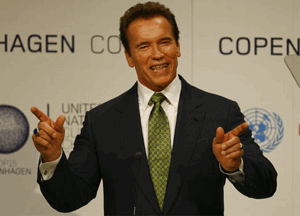
California Governor Arnold Schwarzenegger wants to be remembered for moving states to act on climate change when national governments wouldn't. (Photo: UNFCCC)
YOUNG: Now that Congress has passed a health care bill, there’s speculation about what might be done for the health of the climate. Last year the House of Representatives voted to cap greenhouse gases. But attempts to pull together the 60 votes needed in the Senate appear to be faltering. Conservative Democrats are wary, and the few Republican senators who want action on climate change do not like the bill that passed the House. Maine Republican Susan Collins made that quite clear.
COLLINS: If the House passed cap and trade bill were to come to the Senate floor I do not believe it would get 50 votes much less 60. I am confident that the cap and trade bill that the house passed is dead.
YOUNG: Massachusetts Democrat John Kerry and South Carolina Republican Lindsey Graham are working on a compromise. It would mix a carbon cap on the electricity sector with support for coal, nuclear power and more offshore drilling. Matt Niemerski with the environmental group Oceana says that’s provoking a backlash.
NIEMERSKI: There’s a sense of frustration on the progressive side that perhaps their votes are being taken for granted. What we are starting to see is that the debate has shifted from not how to cap carbon pollution. It has simply come down to, what do we need to give industry in order to pass a bill.
YOUNG: While Congress continues its debate, several states have already taken action.
California led the way four years ago with a law limiting greenhouse gas emissions. It’s just now being put into place. However, with unemployment in California topping 12 percent, opponents say capping carbon could cost more jobs. They’ve launched an effort to block the law.
Living on Earth’s Ingrid Lobet reports that could send shockwaves beyond the Golden State.
LOBET: For nearly a decade, thousands of engineers, scientists and policy makers have been molding California into a model low-carbon economy. In recent years, there's been no more vocal champion of that effort than Republican Governor Arnold Schwarzenegger.

California Governor Arnold Schwarzenegger wants to be remembered for moving states to act on climate change when national governments wouldn't. (Photo: UNFCCC)
SCHWARZENEGGER: In California, we are proceeding on renewable energy requirements, and a cap and trade system for greenhouse gases, and limiting greenhouse gas emissions from cars. Nearly 60 percent of all venture capital in America flows through California, and this is creating the critical mass of money and intellect to develop new, green technologies.
LOBET: This is California as environmental leader. Indeed federal law gives other states the right to adopt stricter air rules once they're created here. But there is another California—communities living with massive unemployment, low-paying jobs and foreclosure—communities where venture capital seems remote. Conservatives and anti-tax groups are organizing in these hard hit areas to try to get a measure on the ballot to rollback California's climate change law.
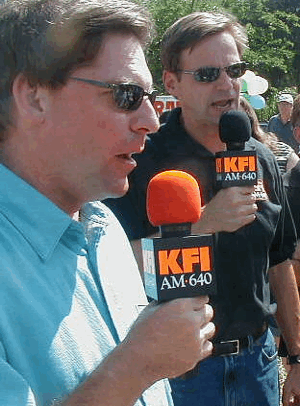
Popular radio hosts John Kobylt and Ken Chiampou are supporting a campaign against California's major climate change law. (Photo: Wikimedia Commons)
KOBYLT/CHIAMPOU: This is suicide! Economic suicide that they are forcing on us! There has never been a groundswell of support from the people saying 'yeah we want to sacrifice a million jobs for a theoretical reduction in carbon dioxide emission,' when nobody else on the planet is doing this. Nobody is for that!
LOBET: That's the John and Ken radio show, broadcast in southern California. The one million lost jobs figure they cite comes from the high-end estimate of a Cal State Sacramento business school study—a study sharply criticized by state economists. On this day, the radio team exhorted listeners for five hours to scrap California's climate change law, which they refer to by a provocative and loaded name.
KOBYLT/CHIAMPOU: Sign the petitions! It’s the California Jobs Initiative to stop the Global Warming Final Solutions act.
LOBET: Governor Schwarzenegger has leaned heavily on businesses not to fund a measure that could tarnish his environmental legacy. So the effort has collected most of its money outside the state, about a million dollars so far, mostly from oil companies, including Valero, which owns two refineries here. Backers believe that as carbon regulations continue to go into effect, more residents will resent the intrusion, and sign on.
KOBYLT/CHIAMPOU: And we told you about the California Air Resources Board, and some of the crazy ideas they’ve been working over the past couple of years. Coming up with the idea of putting tint in your windows, and checking your tire inflation. Regulating the color of the outside of your car because you because you might be able to save two tenths of a degree on the inside. These are the ideas that went public! That’s what I want to get. I want to get the list of the stuff they decided to pass on!
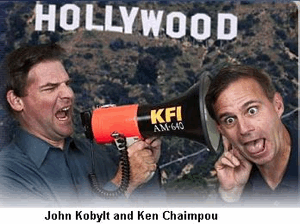
LOBET: If the measure gets on the ballot, it could also increase conservative turnout for the gubernatorial election in November. Jerry Brown is the Democrat in the race. He'd continue climate change efforts. EBay billionaire Meg Whitman is the lead Republican candidate. Democrats are already painting her as a threat.
ANTI-WHITMAN AD: Meg Whitman, who wants to be governor of California, is standing with Sarah Palin and a group of extreme right-wingers in attacking solutions to the climate crisis…
LOBET: But it's not clear how strongly Whitman would oppose California's climate law, known as AB 32. She has said she would delay it.
WHITMAN: So, as governor I actually would place a moratorium on AB 32 by executive order until we fully understand the law’s impact on our economy. I love California's environment but I reject radical environmental policies that do little for the environment and devastate California's economic future.
[APPLAUSE FROM AUDIENCE]
LOBET: But Whitman also says she admires environmentalist Van Jones. She says she met him on an Arctic climate change cruise. And her family foundation has donated $300,000 to the Environmental Defense Fund. One national consultant on climate policies, Terry Tamminen, says the climate change pushback in California hasn't really made the national radar yet, but staffers in Washington are watching.
TAMMINEN: I think it is instructive when you see California, which has been the leader on climate policy in the United States, if you think that AB 32 might falter or even have serious backlash that you then say, maybe as we approach climate change, we should do it in a different way.
LOBET: The next goal for the ballot initiative is to turn in enough signatures by mid-April. Meanwhile, climate change efforts set in motion here continue to roll across the country. On April 1st EPA is set to approve national regulations on greenhouse gas emissions from cars, based on a 2002 law in California. For Living on Earth, I'm Ingrid Lobet in Los Angeles.
Related links:
- California’s climate change efforts
- Governor Schwarzenegger's global warming page
- Petition to repeal AB 32
- Business group in CA active on global warming issue
Climate Change, Plan B
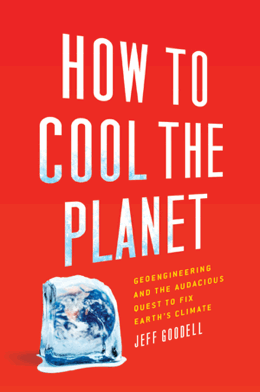
YOUNG: Political inaction on climate change has some scientists thinking about a radical Plan B. It’s called geoengineering—altering the environment in order to manipulate the climate. It sounds like the stuff of science fiction, and the idea of making it reality raises a host of ethical issues. Geoengineering proponents recently gathered at the Asilomar conference center in California to talk about how and whether we should attempt to control the climate. Journalist and author Jeff Goodell was there. His forthcoming book about geoengineering is called “How to Cool the Planet.” Jeff Goodell, welcome to Living on Earth.
GOODELL: Thanks for having me.
YOUNG: So, what’s going with this conference and why is it taking place now do you think?
GOODELL: Well, when it comes down to it, it’s not the technical problems that are the real complexity here. It is the ethical, and political, and social, and cultural questions that are the most profound, and there hasn’t really been a forum yet to deal with that. And I think it’s happening now because we’re at a turning point in how we think about global warming.
And we’ve seen 30 years of talk about this and there’s been a lot of hope that we would sort of get enough information about this and understand the science well enough and we would then get our political act together and cut emissions and deal with this in the way that it obviously needs to be dealt with. But that isn’t happening and this conference is part of a larger sort of opening of rethinking the problem of how we’re going to deal with climate change.
YOUNG: And what are we talking about when we talking about geoengineering, exactly?
GOODELL: Well, I started out the book—and I’d heard about this idea of geoengineering a couple of years ago and I thought it was just a completely crazy idea. And there’s a number of, of course, crackpots in this who want to dump Special K cereal into the ocean in order to change the reflectivity of the ocean or set off nuclear bombs on the moon in order to put moon dust into space to reflect sunlight. But there’s a real, serious corps of scientists who are thinking about this. And the much more interesting part of this is methods of deflecting sunlight from the surface of the earth.

Basically, putting particles into the high stratosphere that would act like tiny mirrors and reflect away sunlight, or brightening clouds to reflect more sunlight off the top of clouds. And the really interesting thing is that, first of all, this is technically not that difficult to do, and you only have to deflect, say one to two percent of the sunlight away from the earth to offset, you know, a kind of doubling of CO2 emissions. But you have to have this continual injection of this stuff up there, and if you don’t the shade will go away and you will have a very rapid warming.
YOUNG: One of the things I really like about your book is you’re not just talking about the ideas here, but the people who are coming up with these ideas, and they’re fascinating. Who are these guys—and they are mostly guys—who want to control the climate? What’s driving them?
GOODELL: Well, two people to me sort of embody the kind of people who are behind this. And one is a man named Lowell Wood, who was a protégé of Edward Teller, who was godfather of the hydrogen bomb and an infamous figure in Cold War science.
He spent a lot of time building the Star Wars missile defense system, he was instrumental in that. And to him this is a kind of playing around with these big ideas that he loves to do—brilliant physicist and I don’t think he’s concerned about the environment, I don’t think he’s concerned even about global warming so much. I think he’s just a guy who likes to be influential.
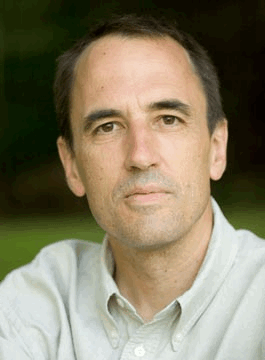
Author Jeff Goodell.
And to me, he’s a kind of scarier side of this because he connects with this whole Cold War establishment. But another kind of person is someone like David Keith who’s a—runs an environment and energy program at the University of Calgary. And David is one of the sort of most serious-minded, most sort of moral human beings that I have ever met. And he’s a physicist and he’s spent a lot of time in the Arctic camping, and is deeply connected to the sort of environment and to the natural world.
And for him, geoengineering is an environmental tool. Basically, he argues that if we want to save an ecosystem like the Arctic, the only real chance to do that is going to be shielding some sunlight and cooling it off so that the ice doesn’t melt so quickly. Other than that, the way things are going, the Arctic is a goner. And so, he sees this as a risky, dangerous, but perhaps useful tool in that quest to kind of save the planet.
YOUNG: Another person who features prominently in your book is Bill Gates. What’s his interest in all this?
GOODELL: Bill Gates has funded some of David Keith’s research and some other scientist’s research into this. I think that Bill is interested in this for the same reasons that a lot of people are, in that he sees that we’re not doing anywhere near enough to confront this challenge, and so like many people he’s started to think of what else we might do. And it’s hard to deny that there’s kind of a techno strain going through this whole idea of geoengineering.
It’s very popular among people like Gates; it’s very popular in Silicon Valley, places like that. It’s a kind of even geeky idea because it sees the climate as a system that can be hacked and manipulated. And I think on some level that’s what Gates’ interest is; he sees the climate system as not so different than an operating system for a computer that ultimately we can figure out how to manipulate.
YOUNG: You also spend some time in your book pointing out the way things could go wrong with this, and your fears. What are your fears about geoengineering?
GOODELL: Oh, it’s a very long list. I mean we’re sort of messing with the gears and levers of the climate and we can’t make a perfect climate for everybody. You know, who gets the sort of better climate, who decides? I guess my biggest fear is that we could really—someone could start doing this and doing it badly.
If we get into a situation, or any nation gets into a situation, where climate change is causing extreme droughts or famine is driving by droughts that are linked to climate change, and there’s real calls to do something about this—a nation, whether it’s ours, or China, or India, or anyone else could just say they’re going to do this for political reasons: ‘Look we’re doing something, we’re trying to fix this.’
And you know, for example, in China they’re doing a lot of weather modification, cloud seeding and things like that trying to make it rain even though the science on that is very sketchy. For the 60th anniversary of the party last year they sent a bunch of planes up and tried to make the sky blue because they wanted blue sky for the day of the celebration. And so the political symbolism of this is sort of really dangerous, and it could be used simply as a political tool.
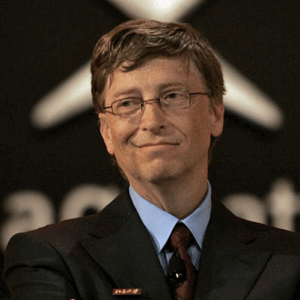
Bill Gates, one of the influential men interested in geoengineering.
YOUNG: This is such a hot topic, and one of the things I’ve encountered is just bring it up can be controversial because some people look at this whole topic of geoengineering and say, ‘Well, people are going to think this is a quick and easy fix and therefore you don’t have to worry about the real solutions to global warming.’ Is that still a factor here?
GOODELL: It’s a huge factor and I think that’s one of the things that everyone who thinks seriously about this is really afraid of because the only way that this sort of makes sense at all is—to keep in our back pocket as a sort of emergency response plan—to think that we can fix this complicated problem with this sort of simple fix by throwing little particles in the stratosphere is just very delusional and very, very kind of dangerous thinking. And there’s really the motivation for a lot of scientists who are thinking about that because they really want to show that, hey, this is possible, but you know what?
There’s a lot of other consequences to this. We might really change the weather patterns on the planet by doing this. I mean one of the fears that a lot scientists has is that the fossil fuel industry will get a hold of this essentially and begin in subtle ways arguing that this a way of buying time and why we don’t need to push so hard on cutting emissions right now. One of the things I like about the discussion about geoengineering is that it makes explicit this idea that we are in control.
Right now, we are in control. We are pushing the planet towards a completely different kind of climate, but we’re in denial about it. We want to pretend that we’re not responsible for what’s going to happen to the future of the planet, but in fact, we are responsible!
YOUNG: So we have folks gathering at these conferences to talk about the ethics of geoengineering, we have Congress looking into putting money into research, we have billionaires like Bill Gates looking to geoengineering—what would be a good outcome you think of all of that focus and interest?
GOODELL: Well, I think the best outcome of all this focus and interest would be to galvanize people to say, ‘Hey, if we don’t do something seriously about cutting emissions, if we don’t agree to some kind of global Copenhagen-like agreement, we are going to end up geoengineering the planet. And that’s a scary scenario because we might really screw it up.’
I think the second best outcome is that we take this idea seriously and make this a legitimate piece of the toolbox of how we might think about dealing with global warming. We might not ever need to do it, we might not ever want to do it, but I think that we need to know more about it so that we can decide as a culture whether to take this seriously or not and what the risks really are of going down this road.
YOUNG: Jeff Goodell’s new book is “How To Cool The Planet: Geoengineering and the Audacious Quest to Fix Earth’s Climate”. Thanks very much for talking with us.
GOODELL: Thanks for having me.
Related links:
- For more on Jeff Goodell’s book, click here.
- Click here to learn more about the Asilomar conference.
[MUSIC: Captain Beefheart “A Carrot Is AS Close As A Rabbit Gets To A Diamond” from Dust Sucker (Oz It Records 2002)]
YOUNG: Coming up, celebrity chef Jaime Oliver’s food revolution hits close to home. Stay tuned to Living on Earth.
ANNOUNCER: Support for the environmental health desk at Living on Earth comes from The Cedar Tree Foundation. Support also comes from the Richard and Rhoda Goldman Fund for coverage of population and the environment. And from Gilman Ordway for coverage of conservation and environmental change. This is Living on Earth on PRI – Public Radio International.
The Postman Rings Greener
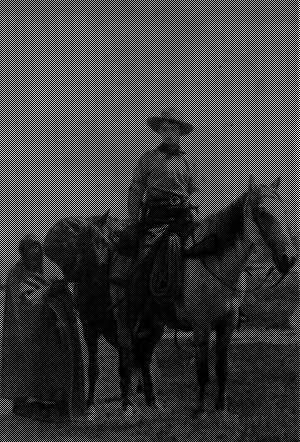
A Pony Express rider (Courtesy of the National Archives)
YOUNG: It’s Living on Earth, I’m Jeff Young.
[HORSE GALLOPING SOUNDS]
YOUNG: April 3rd marks 150 years since the first ride of the Pony Express. And the anniversary carries a timely lesson for us today. The Pony Express was the first over land route to transport mail from the East Coast to California.
Trains carried mail to St. Joseph, Missouri where riders—some as young as 13—carried it by horseback to Sacramento, California. Cindy Daffron, director of the Pony Express Museum in St. Joseph, says it was one tough mail route.
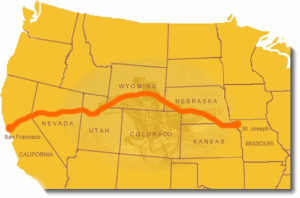
The Pony Express went from Missouri to California. It was the first land route across the United States to deliver the mail. (Courtesy of the Bureau of Land Management)
DAFFRON: If you’ve been around a horse you know at a full gallop they are a 20-mile-an-hour animal and we know they can’t keep that up for any period of time. So we say more of an average is ten to 12 miles per hour.
Now every seven to 15 there would have been what we call a relay station. Some kind of a building with a spare horse there and that guy would have been responsible to take care of the horse, wait for the rider to come in, get him exchanged. Two minutes is all they designed for those guys to get off one horse, and head out.
YOUNG: As famous as the Pony Express is, it went belly-up after only a year and a half. Mail by pony could not compete with the telegram. Today’s postal service also faces stiff competition from electronic communication. The USPS could be hundreds of billions of dollars in debt in the coming decade, so it’s looking to save money by cutting Saturday delivery and using less fuel.

A Pony Express rider (Courtesy of the National Archives)
[SOUNDS OF VAN MOVING]
YOUNG: Everett, Massachusetts, letter carrier Wayne Post delivers with alternative fuel.
POST: I drive a Dodge van. But it’s a flex fuel vehicle. It uses regular gasoline and it uses the flex fuel, it’s an eco-friendly type of fuel that they have on the vehicles, the newer ones. Let’s go fill up.
[TANK AND GAS FILLING SOUNDS]
YOUNG: The Postal Service is doing more than trimming its budget this way. It’s also reducing its carbon footprint. It’s Sam Pulcrano’s job to keep track of such things. He’s vice president of sustainability for the USPS.
PULCRANO: We already have one of the largest alternative fleets in the world, about 44,000 vehicles. We have vehicles out there running on CNG, propane, electric vehicles, as well as hydrogen fuel cell vehicles. And just very, very recently we just awarded a contract to five different companies to take that current vehicle—the ubiquitous postal vehicle that you see on the street every day—and to change them into being all-electric vehicles and we’re in the process of developing, and we’ll be testing them this summer.

Many of the USPS fleet of trucks run on alternative fuel.
YOUNG: And how would eliminating Saturday delivery affect the Postal Service’s carbon footprint?
PULCRANO: Well, what reducing one day of street delivery will reduce our delivery vehicle use, transport fuel use, and also some facility energy use. In terms of greenhouse gases, reducing that would equivalent to about 315 to 500 thousand metric tons of greenhouse gas emissions a year. That would be equal to about 60 to 95 thousand gasoline-powered passenger cars.
YOUNG: To be honest, when I got to thinking about the postal service and greenhouse gas emissions, I thought here’s an area where maybe we could do away with the Postal Service and save us a lot of greenhouse gas emissions. Is that necessarily so?
PULCRANO: Not really, our direct emissions total about five point three million tons, roughly equivalent to one million gasoline cars driving an average of 12,000 miles on the road each year. But to put that in perspective for you that’s only one 20th of one percent of the total greenhouse gas emissions in America. And we are an anchor of the U.S. economy. We move billions of dollars in bill payments and remittance payments between businesses and industry each and every day, and it shouldn’t be lost on folks that we deliver 40 percent of the world’s mail in the United States.
YOUNG: So, what’s the plan for cutting the energy use and the greenhouse gas emissions if you’re still planning to maintain that level of business?
PULCRANO: Well, we have several goals. First is our goal to reduce our electrical energy use—30 percent by 2015—and to date we’re down about 21 percent towards that goal. We have another goal of reducing our fuel use 20 percent by 2015, and just this year alone we took our about a million and a half gallons last year in fuel use and we’re down about two point three million a year to date, this year.
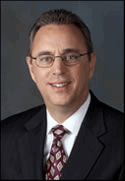
Sam Pulcrano is Vice President of Sustainability for the United States Postal Service.
And in addition our facilities team, they’re going out to our largest energy users and installing more high-efficiency lighting, putting in programmable thermostats, more efficient heating systems and ventilation systems, etcetera.
YOUNG: You know, we kicked this off by talking about the big anniversary for the Pony Express. Any ponies still in use?
PULCRANO: Uh, yes there are. We still deliver mail, as well as food and medical supplies, to those who live at the bottom of the Grand Canyon, and we do that every week. Obviously, that’s one of our more environmentally friendly methods of delivering mail as well as other very essential life supporting supplies to the communities down there that need them.
YOUNG: It’s a biofuel-powered system of transportation you have there.
PULCRANO: Yes, and it’s very easy to recycle.
YOUNG: Sam Pulcrano is vice president of sustainability for the U.S. Postal Service. Thanks for your time.
PULCRANO: Thank you, Jeff.
YOUNG: If Congress approves the measure, Saturday mail delivery could be history next year.
Related link:
Pony Express Museum
[MUSIC: Eddie Bo “I Got The Blues” from New Orleans Solo Piano (Night Train International 1995)]
Food Revolution

Jamie Oliver
YOUNG: British celebrity chef Jamie Oliver is bringing his brand of food edu-tainment to the America—specifically to America’s unhealthiest city. Oliver took on school nutrition programs in England, and wants to do the same in the U.S. The title of his new TV series sums it up: Jamie Oliver’s Food Revolution. Jamie Oliver, welcome to Living on Earth.
OLIVER: How you doing? Thanks for having me.
YOUNG: Now, tell me about Huntington, West Virginia.
OLIVER: The tri-state area of West Virginia was the area that seemed to have the biggest problem of obesity, diabetes, various strokes, heart disease. For that, obviously, we did our research and we looked at the CDC report which is a government report on disease and so we focused in on that area, and we went to the biggest metropolitan area, which was Huntington.
Lots of people are almost fatigued by the stats and the bad news, but from my experience over the last seven years, telling really people stories, getting in their homes, working with them. Trying to give them simple bits of good information that can help them change their lives and give them choice is what it’s all about. But we didn’t just want to do it with one family, it was the whole town.
YOUNG: You want to know another fun fact about Huntington?
OLIVER: Go for it!
YOUNG: It’s my hometown.
OLIVER: Is it really?!
YOUNG: It’s where I grew up, right there in that corner of West Virginia.
OLIVER: It’s a beautiful place; it’s a really lovely place. And quite interesting in the sense that Huntington and West Virginia has the biggest collection of small farms in the whole of the United States, and yet this area has got these problems.

(Courtesy of Jamie Oliver)
YOUNG: You know, I saw some of the clips of your program, and one of the defining characteristics of Huntington, my hometown, is that it values tradition, which is good, but it also means it is highly resistant to change. And I understand you got really engaged in that…
OLIVER: Well, it’s not just Huntington, I think change is the biggest uncomfortable thing for all of us, and I think Huntington was fully aware of the CDC report, you know, and they kind of had a magnifying glass poked on them there for a number of years. The reality is that Huntington’s health statistics last year when we did the report were three percent away from the national average; so basically, Huntington’s story is America’s story.
YOUNG: Your trip into the school there—it was pretty amazing. There was this scene, and I want to hear just a bit of it where you hold up some vegetables to see if the kids can identify them, and…well, let’s hear just a bit of that:
OLIVER: Who knows what this is?
[DRAMATIC MUSIC]
KID: Potatoes!
OLIVER: Potato. So, you think these are potatoes? Not potatoes, though.
KID: I don’t know.
OLIVER: Do you know what this is? No? Who knows what tomato ketchup is? Yeah. That’s what it’s made out of.
KID: Oh, tomato ketchup, I know that one!
YOUNG: So, they don’t know tomatoes when you hold up tomatoes?
OLIVER: That’s an important scene for me. I’ve done that in several countries. I’ve done that scene in England, and it’s exactly the same. England’s the most unhealthy country in Europe. America, you know, you’re doing pretty well on the world. We spend our lives as parents, saying, ‘Oh, mind that street, be carefully how you go down there, you don’t want to get mugged or crime, or gun crime.’ All of the deaths from homicide don’t even compare in quantity to the amount of deaths of diabetes and obesity and these things.
YOUNG: Your program is “Food Revolution”. Let me ask you this: do you think in the end that you really, that you really changed anything there?
OLIVER: Really, it’s now for that community and the groups of people that I work with to sort of become local ambassadors of change and really carry on showing America that anyone can do it! What I think is going to be exciting is seeing what does happen in Huntington.
The community kitchen that we set up with free cooking lessons, that’s got funding for the next year and a half. What I’ve raised, fundraised cash locally, to sustainably roll out every single school in the area—probably the school you went to as a kid—to go from the reheated junk to fresh foods.
YOUNG: So, when I go back home, will I see people eating differently in Huntington?
OLIVER: Well, you know what? Over the next three years I believe so, yeah. And I think the food revolution isn’t just about schools, it’s not just about the home, it’s about the supermarkets: what they’re selling, how they’re selling it, how they’re trying to educate people and how they can do stuff they’ve never tried before, but also the restaurants and the fast food industry.
There is certainly back home there’s been a massive swirl of what you would perceive as the bad guys actually doing some really radical, good work where they buy stuff from, what’s in the food. So, give me three or four years you might start seeing some really clear things happening. But I think Huntington’s got a lot to be proud of.
YOUNG: Jamie Oliver, thank you very much for your time.
OLIVER: Thank you very much for having me.
Related link:
Jamie Oliver’s website
Not Your Average Cabbage
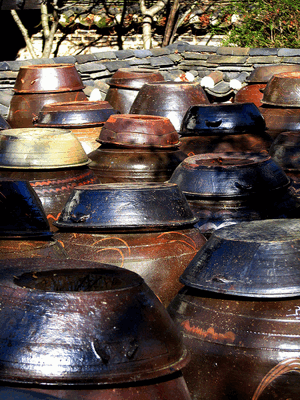
Kimchi is kept cool and stored in earthenware pots. (Photo: ouhdeyeah)
YOUNG: The national dish of Korea is a spicy, pickled salad called Kimchi. It’s known for its peppery flavor and distinct, pungent aroma. It’s an acquired taste for some, an obsession for others who credit Kimchi with improving health and the environment.
Living on Earth’s Ike Sriskandarajah got a taste at Boston’s first Kimchi cook-off.
MAN1: I like my Kimchi to be very spicy, very garlicky.
PENELOPE TAYLOR: I have this spicy throat. [COUGH COUGH]
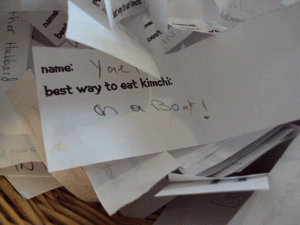
Enthusiasts debate the best way to eat kimchi. (Photo Credit: Penelope Taylor)
MAN2: But, you know, it requires some fortitude:
SRISKANDARAJAH: It’s not for the faint of palette. But as this bustling hall in Theodore Parker Church in West Roxbury demonstrates, foodies of all sorts go crazy for kimchi.
LEWIN: My name is Alex Lewin; I’m one of the co-organizers of the Kimchi Festival and I’m one of the judges. If you open one jar of kimchi in a room the whole room smells like kimchi, and if you open—we probably have 25 jars of kimchi in here—yeah it’s sort of sensory pandemonium.
SRISKANDARAJAH: The base of most kimchi concoctions contains pickled cabbage and chili pepper paste with a mixture of vegetables: scallions, radish, ginger and garlic. Non-traditional entries in the kimchi-off experiment with cranberries, honey and bits of chocolate.
[SOUNDS OF CROWD]
SRISKANDARAJAH: Armed with a clipboard and palette cleansing barley tea Lewin weaves through the crowd tasting the two-dozen contest entries.
LEWIN: We have in our head a list of qualities of good kimchi—the right amount of saltiness, you know, there’s a wider array for sourness, you can have a younger kimchi that’s not as sour, a more fermented one that’s more sour. You want it to be crunchy you don’t really want it to be too soggy.
ROELOFS: The smell… it’s the smell of life.

(Photo Credit: Minwoo)
SRISKANDARAJAH: Cora Roelofs, who conceived the festival, sports a traditional Korean coat.
ROELOFS: Yes, I’m wearing a hanbok; it has actually kimchi pots on the bottom of it, decorative kimchi pots.
SRISKANDARAJAH: The small, blond lady festooned in fermentation vessels is not out of place among the cult-like devotees here today. Kimchi whips up such fervor not only for its flavors, but as Roelofs puts it, for…
ROELOFS: The wonderful delights of the fermented food and their health and life-giving properties so…
SRISKANDARAJAH: Kimchi has been championed as one of the world’s healthiest foods. Researchers have suggested it boosts immunity to SARS virus and a nutritionist working on erectile dysfunction recommends it over Viagra.
[SOUNDS OF CROWD]
SRISKANDARAJAH: You don’t have to look far to witness Kimchi’s nutritional power. Martial artist Ing Won Jong pops a hunk of orange cabbage into his mouth, flexes for the audience and prepares to leap over a line of girls to break a wooden board.
WOMAN: The girl’s covering her head.
[CLAPPING SOUND, APPLAUSE]
SRISKANDARAJAH: And do you think Kimchi made you stronger?

Kimchi is kept cool and stored in earthenware pots. (Photo: ouhdeyeah)
JONG: Yeah of course, I have eaten over thirty years. Yeahhh.
SRISKANDARAJAH: And it’s not just healthy. Local, farmer and Kimchi contestant, Greg Maslow says preserving food is key to sustainable living.
MASLOW: Anytime you can get people thinking about making their own food and preserving food it has a lot of environmental implications. For example with Kimchi or sauerkraut it’s a way to extend the season of eating local and you’d be able to ferment food and keep it all the way through until to the next year some point.
SRISKANDARAJAH: The art of fermentation is one of the oldest, easiest ways to preserve food. For over 3,000 years Koreans have been chopping up spices and vegetables and burying them in stone clay pots. No electricity or preservatives—just a jar and some patience.
The Kimchi song: "Spice up your heart and empower yourself."
[SOUNDS OF CROWD]
SRISKANDARAJAH: But while anyone can make a kimchi, the perfect kimchi is a thing worth celebrating.
ANNOUNCER: Best kimchi in show for the first annual Greater Boston Kimchi Festival goes to Patricia Yu for her radish kimchi —
SRISKANDARAJAH: What do you think is the secret to the winning kimchi?
YU: I used whole radishes. I’m not sure what the secret to the whole kimchi was. I really don’t know.
SRISKANDARAJAH: The mystery may continue to elude us. But there’s no shortage of aficionados trying to unlock the secret to kimchi. And for its health and ecological benefits many are singing its praises.
[KIMCHI SONG IN THE KEY OF GERSHWIN]
SRISKANDARAJAH: For Living on Earth, I’m Ike Sriskandarajah.
[SONG CONTINUES]
Related link:
Check out Alex Lewin’s blog about palatable pickles.
YOUNG: On the next Living on Earth, we travel with reporter Alex Chadwick to Central Africa’s Congo Basin for a look at efforts to save the carbon-rich forest.
[SOUNDS OF TROPICAL FOREST]
CHADWICK: It’s like nature’s Disneyland. We recorded this near what had been a small cluster of Baka people—pygmies. They’ve abandoned this site, or been chased away. We’re in a forest space they had cleared for a shrine. We’re staying quiet, recording. It’s dawn.
[SOUNDS OF FOREST]
CHADWICK: There are many ideas about what to do with all this forest.
BAKARY: If I were the head of state in this country I would advocate we continue to destroy the forest.
CHADWICK: A government official in Cameroon’s capitol, Yaoundé. We’d spoken to him about this forest several days earlier.
BAKARY: Who are destroying the forest in Cameroon? The Europeans! Americans—
CHADWICK: The timber companies
BAKARY: Yeah. The timber companies. You see, you have to keep in mind one thing. You America, the most richest country on earth, the most powerful country on earth, you used to have lot of forests in your own cities and country. Where is your forest? You destroy it. Now you come in Cameroon and you say, ‘Oh, guy, stop destroying your forest.’ Then why? Why don’t you want us to destroy our own forest to do the same thing that you did?
CHADWICK: Issa Tchroma Bakary, Minister of Communication, and skilled at it, the ‘cut-it-down’ rant a caricature he says. But what lies behind it—poverty, need, isolation, crippled lives—those are real, and especially in forest communities.
YOUNG: Saving Africa’s great forest, next time on Living on Earth.
[MUSIC: Orchestra Baobab “Ray M’Bele” from Pirates Choice (World Circuit 2004)]
YOUNG: Living on Earth is produced by the World Media Foundation. Our crew includes Bobby Bascomb, Eileen Bolinsky, Bruce Gellerman, Ingrid Lobet, Helen Palmer, Jessica Ilyse Smith, Ike Sriskandarajah, and Mitra Taj, with help from Sarah Calkins, Marilyn Govoni and Sammy Sousa. Our interns are Emily Guerin and Bridget Macdonald. Jeff Turton is our technical director. Alison Lirish Dean composed our themes. Steve Curwood is our Executive Producer. You can find us anytime at l-o-e dot org. I’m Jeff Young. Thanks for listening.
ANNOUNCER: Funding for Living on Earth comes from the National Science Foundation, supporting coverage of emerging science. And Stonyfield Farm, organic yogurt and smoothies. Stonyfield pays its farmers not to use artificial growth hormones on their cows. Details at Stonyfield dot com. Support also comes from you our listeners, The Ford Foundation, The Town Creek Foundation, The Oak Foundation, supporting coverage of climate change and marine issues. The Bill and Melinda Gates Foundation, dedicated to the idea that all people deserve a chance to lead a healthy, productive life. Information at Gates Foundation dot org. And Pax World Mutual Funds, integrating environmental, social and governance factors into investment analysis and decision making, on the Web at Pax World dot com. Pax World – for tomorrow.
Living on Earth wants to hear from you!
Living on Earth
62 Calef Highway, Suite 212
Lee, NH 03861
Telephone: 617-287-4121
E-mail: comments@loe.org
Newsletter [Click here]
Donate to Living on Earth!
Living on Earth is an independent media program and relies entirely on contributions from listeners and institutions supporting public service. Please donate now to preserve an independent environmental voice.
NewsletterLiving on Earth offers a weekly delivery of the show's rundown to your mailbox. Sign up for our newsletter today!
 Sailors For The Sea: Be the change you want to sea.
Sailors For The Sea: Be the change you want to sea.
 The Grantham Foundation for the Protection of the Environment: Committed to protecting and improving the health of the global environment.
The Grantham Foundation for the Protection of the Environment: Committed to protecting and improving the health of the global environment.
 Contribute to Living on Earth and receive, as our gift to you, an archival print of one of Mark Seth Lender's extraordinary wildlife photographs. Follow the link to see Mark's current collection of photographs.
Contribute to Living on Earth and receive, as our gift to you, an archival print of one of Mark Seth Lender's extraordinary wildlife photographs. Follow the link to see Mark's current collection of photographs.
 Buy a signed copy of Mark Seth Lender's book Smeagull the Seagull & support Living on Earth
Buy a signed copy of Mark Seth Lender's book Smeagull the Seagull & support Living on Earth

